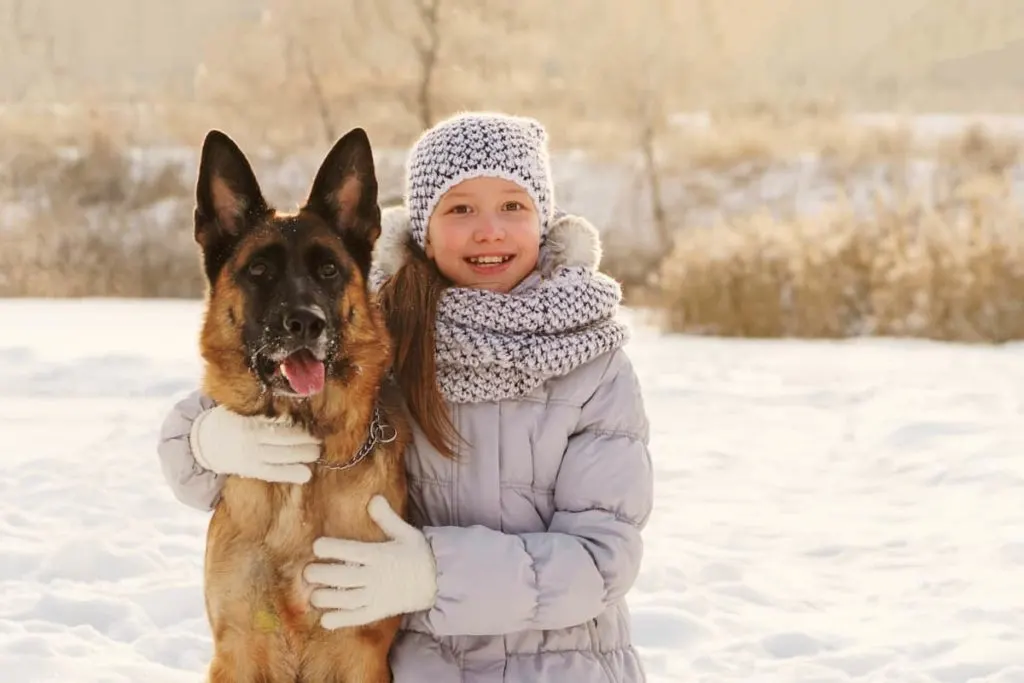
When choosing a dog for a family with children, it can seem daunting and perhaps a bit frightening. What if you choose the wrong breed and the kids and dog don’t mesh well?
Not only would this be heartbreaking for the family, but the dog could suffer needlessly, too. In a worst-case scenario, it could end in tragedy. But there are so many dog breeds to choose from, where do you even start?
Fret no more: you’ve found the right place to start your search for a new family dog!
Below, we’ll discuss in detail the best large dog breeds for families with children.
Instead of just a list and a snippet on each breed, we’ll dive deep into why each breed was selected, the type of family dynamics that would be best for that particular breed, and some tips on how to select a specific dog from each breed.
Click Here to Jump to a Section
What Makes the Best Large Breed Dog for Families With Children?
There are many things to look out for when choosing a new family dog, especially if there are children involved.
Where you live, how you live, and what your expectations are all matter when selecting the best large breed dog for your family. Some dogs are great for singles or couples, but they might not be great with kids. What actually makes a dog good for kids though?
Temperament
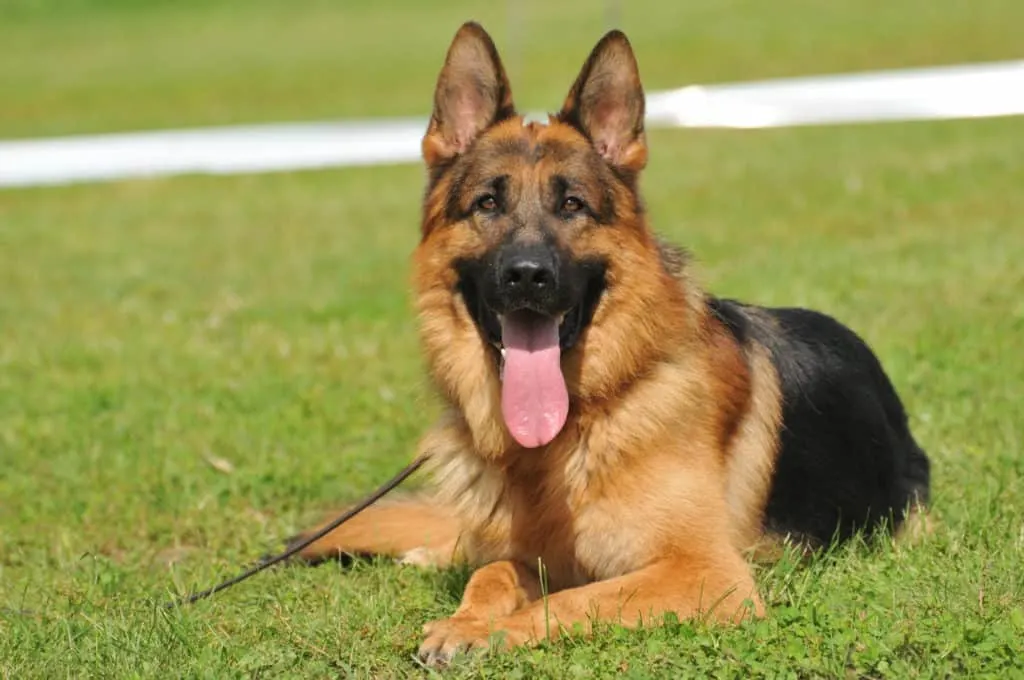
The most important aspect of choosing a large breed dog for a family with kids is their overall temperament.
That word gets thrown around a lot, but it’s not always clear what people mean when they say it. By definition, temperament means “Disposition, especially with regard to emotional make-up”.
In short, it means a dog’s general personality and tolerance level. While each dog will be an individual with its own quirks and behaviors, there is an overall temperament that each breed is expected to have.
These general personalities range from hyperactive to super calm, aggressive to incredibly gentle, and everything in between.
In the case of large breed dogs for families, you want an even temperament that shows patience and a calm demeanor that can counteract the unpredictability of children. A balance of playful energy and snuggles is ideal.
An aloof dog, for example, may not enjoy interacting with children, or one that’s always hyper at all times may not understand that kids don’t always want to play.
Friendliness
Arguably this could go under the temperament category, but we see this as a separate aspect. Here’s why. A dog with an even temperament (as mentioned above) may not be the friendliest dog.
In fact, even if a dog has a calm demeanor, they may not want to interact with children or even adults.
It’s important that any family dog that will be exposed to children has a soft, friendly personality. They should want to be around kids and enjoy their company, not just tolerate it.
Trainability
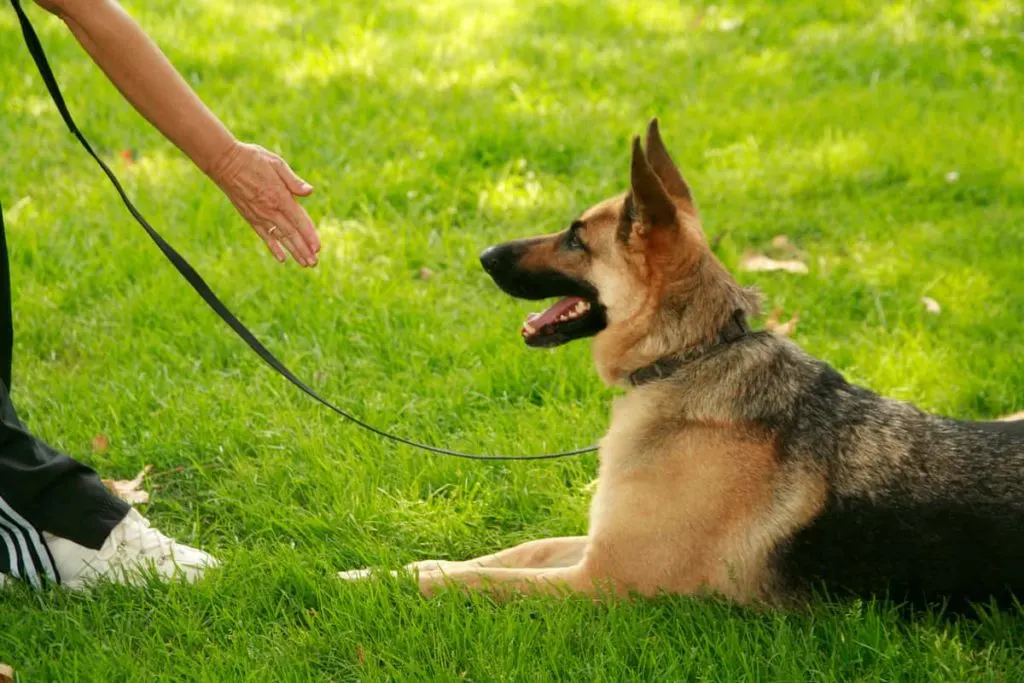
A good family dog will be relatively easy to train and eager to please her humans. This is vital to a healthy and safe relationship between the dog and the kids.
Without good training, a large breed dog could hurt the children inadvertently – and the kids could hurt the dog, too. Training will make sure everyone in the household knows the rules and sticks with them.
Dogs need guidance, so teach them early on what’s expected of them and how they should behave. But the same goes for the kids. Be sure your children are old enough to learn and follow safe dog-handling rules.
After all, it’s not just the dogs who need training! The whole family should be involved in this process.
Intelligence
A smart dog will be able to tell the difference between a rambunctious child and one intending harm. Intelligent dogs are able to quickly decide on a course of action that will please their human companions while keeping themselves and their families safe.
While intelligence itself is important, couple that with great training and you have a dog ready to be his best self. Tapping into a dog’s natural intelligence will make training that much easier and stick much quicker.
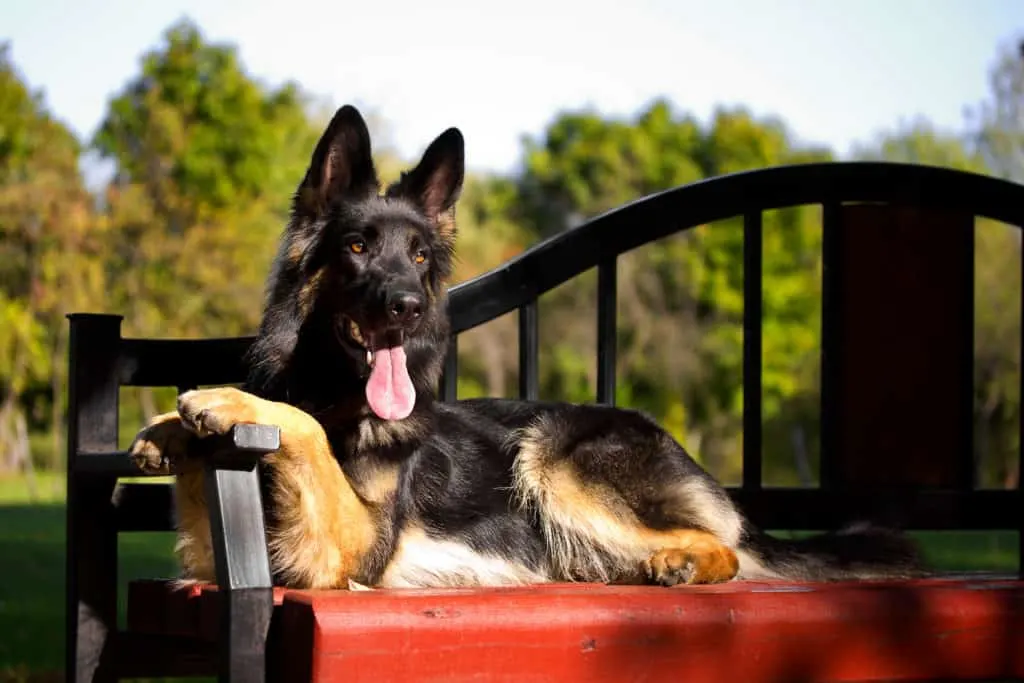
Do keep in mind that some of the smartest dogs available can also be some of the toughest to train. It sounds counterintuitive, especially after what we just said, but hear us out.
There is such a thing as a little too smart. These dogs can become antsy, anxious, and upset if they’re not given enough exposure to stimulating and exciting things.
If you find yourself with an extremely intelligent dog, just be sure to provide some fun things for him to explore, play with, and figure out on his own.
Loyalty
We’ve all seen the sweet videos of the dog waiting patiently for the school bus to come, then getting excited when their human emerges. That’s loyalty in action. A great family dog will love her human companions and seek to spend time with them.
Loyalty brings affection, attention, and obedience. Loyal dogs are also less likely to wander away, reducing the chances of heartache from a lost dog situation.
Affectionate
Large breed dogs are often naturally affectionate and friendly, but when you have kids, this trait becomes even more important. Children of all ages often love dogs to the point of smothering them.
A patient, intelligent, friendly, and loyal dog should also have an affectionate trait. This kind of dog will love the attention of children and may even seek it out.
You should always teach children to be mindful and respectful to your dog though. Even the most affectionate large breed family dog will need some time alone once in a while.
Provide a calm, quiet, private space for your dog to unwind and relax without being interrupted by well-meaning but sometimes overly-loving kids.
Your Home and Family Matter When Selecting a Dog!

Many people overlook the fact that your home situation and family are a big part of selecting the best dog. It’s a matter of knowing your energy level, your kids’ behavior, your lifestyle, and the space you have available for a big dog.
For example, if you live in a small apartment with three rambunctious toddlers, you would need a much different dog than if you lived on a farm with one well-behaved teenager.
Every aspect of family life will matter in this decision, so be sure you pay close attention to the wants, needs, and abilities of everyone who will come in contact with your new dog.
There are too many variables for us to go over here, but a quick list of considerations should include:
- Your time. How much time can you spend on training the dog and your kids?
- Space. How much space does your potential dog require?
- Level of experience. Have you handled dogs before? Have your kids?
- Exercise options. Is there enough room inside for your new dog to play on his own, or will he have access to outdoors?
- Age of the kids. Younger kids are unpredictable and should never be left alone with a dog of any size.
- Energy level. Do you and your kids have enough energy to commit to training and playing with certain types of dogs, or would you all be happier with a calmer breed?
Best Large Breed Dogs for Families With Children
With so many things to consider, it’s no wonder many people feel overwhelmed trying to select the right dog for their children. To make things a little easier, below you’ll find a detailed list of the large breed dogs that have proven to be great choices for families with kids.
Every dog listed below has a long track record of being a great family dog. However, please be sure to properly train your dog, whatever breed you choose. None of these attributes will matter if your dog hasn’t been trained and properly socialized!
German Shepherd
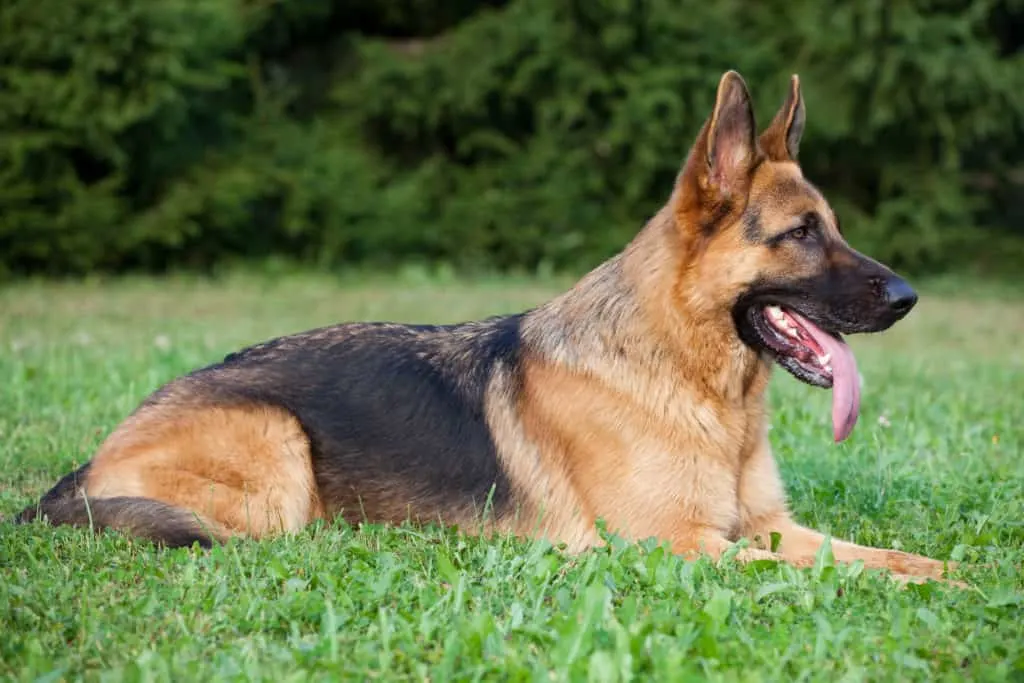
Obviously, we’re going to think German Shepherds are the best family dogs, but you don’t need to just take our word for it. Time and time again, the GSD has appeared on lists much like this one, and for good reason.
This breed has proven to be a friendly, loyal, and gentle large breed dog that does exceptionally well with children of all ages.
The GSD was bred as a working dog for military, police, and rescue situations. But they were also bred to be loyal and protective companions for humans.
After all, the jobs they were bred to do all have to do with keeping humans safe! You could say that loyalty and protection of human beings is in their blood.
Part of that loyalty is given to the human children in their pack. In fact, many GSDs are often more protective and loving toward the kids.
It may be because they know children are the most vulnerable in the family, or it could be that the GSD just really likes kids. Whatever the reason, it’s no secret that GSDs and children often get along beautifully.
Why This Dog Is Great for Kids
There are so many reasons the German Shepherd is great with kids, it’ll be hard not to spend hours on this breed alone. We’ll do out best to contain our excitement though and give you just the facts.
Intelligence
As mentioned above, intelligence is one of the defining features of a dog that’s good with kids. The German Shepherd excels in the intelligence realm and it’s obvious.
A well-trained and socialized GSD will follow commands and understand his or her role even without your input. This means that kids who have been taught how to handle the family dog will be able to issue commands and be delighted to see their beloved GSD follow through.
But it goes beyond following commands. The GSD is smart enough to know when it’s not safe to do something and how to identify dangers that kids themselves may miss.
Loyalty
GSDs are known as one of the most loyal, dedicated, and hardworking large breed dogs. They want to please their humans and they have a sense of self-worth that many other breeds lack.
This is great for families with kids because it means your GSD is more likely to stick with your child, be present in his or her life, and make an effort to be a part of your child’s day.
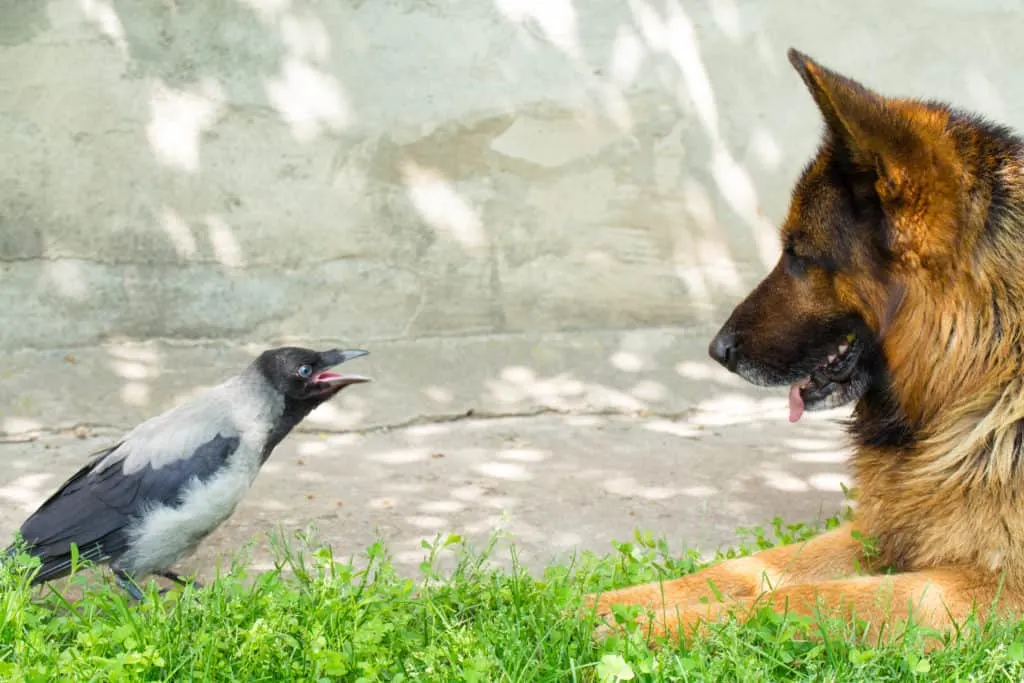
It also means your GSD is less likely to wander off and get lost, leaving a heartbroken kid at home in tears. With loyalty comes a sense of protection, too.
You can trust a GSD to stand watch over your kids and your home, keeping them safe. As we often do, we want to make sure you know not to leave any dog alone with a small child for any reason, though. Your dog is not a nanny!
Patience
German Shepherds are incredibly patient dogs. This attribute is amplified by their intelligence and loyalty. Are you seeing the pattern of how these traits are building on one another?
GSDs are patient dogs, especially when children are involved. They seem to know that kids can be unpredictable and maybe a little rambunctious, but it rarely fazes them. A good GSD will simply sit back, watch, and allow kids to be kids, understanding that it’s normal.
Gentleness
You wouldn’t think a dog that can weigh over eighty pounds would be considered gentle, but it’s true. Even though these dogs are muscular, agile, and can overpower a full-grown man, they are also incredibly gentle when it comes to playing with kids.
Once again, this goes back to that intelligence, patience, and loyalty. A well-socialized GSD will know the difference between an adult and a child, and they will adjust their behaviors accordingly.
How many pictures have you seen with a young child resting their head against a calm, protective German Shepherd? This classic scene plays out day after day in homes all over the world because the GSD is such a gentle dog.
Affection
German Shepherds adore their humans and will lavish affection upon them. They love to be pet, stroked, brushed, and loved on. These big softies enjoy being pampered and snuggled, and they’re not shy about asking for some love.
American Pit Bull Terrier
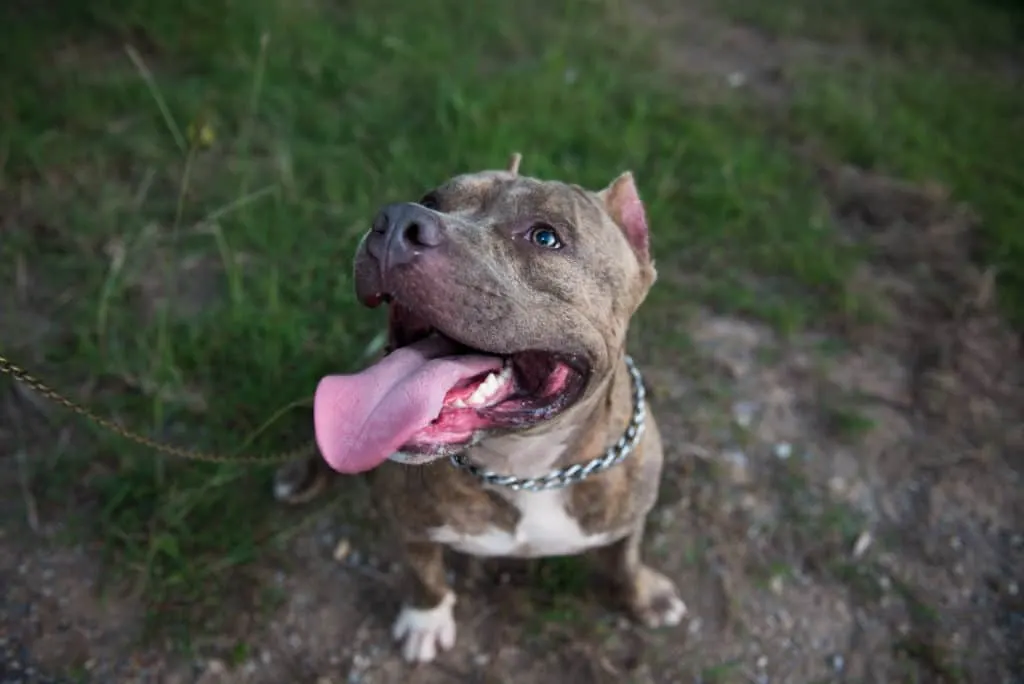
These sweet-natured, loving, and loyal dogs are naturally family-oriented. They love children, and they want you to be pleased with them.
The bad reputation this amazing breed has received is unfair and unfounded. No pit bull is “born to fight”, in fact, fighting is the last thing a well-loved and socialized pittie wants to do.
They know they’re big and strong, but they’re also intelligent enough to know that they don’t need to use that strength to hurt anyone.
American pit bull terriers are known as “lovers” and “lazy”. If that kind of energy is what you want in your house, turn your attention to these other pit bull traits that make them great family dogs.
You may doubt our authority on this one, but that’s okay. You can check out this video with some of the myths about the breed and the real truth.
Why This Dog Is Great for Kids
Take some time to cruise Youtube for pit bull videos with kids and you’ll see for yourself how this unfairly maligned breed behaves. Sweet, loving, gentle, and loyal, the pit bull is a great family pet for families who want equal amounts of playtime and lazy days.
Sweetness
We cannot stress this aspect enough. The American pit bull terrier is one of the sweetest and most loving large breed dogs. This is a natural trait, but it can easily be encouraged and amplified with good training, affection, and socialization.
Loyalty
Pit bulls are known to be loyal dogs that want nothing more than to be by your side. They bond quickly and deeply with their families, making them unlikely to wander or run away.
This can mean that pit bulls who aren’t properly socialized may develop separation anxiety, so be sure to make training a priority.
Patience
It’s hard to make a pit bull angry or afraid, which means they have mountains of patience for unpredictable kids and new situations. Their desire to please you feeds into their patience, which is great for raising a loving, good-natured dog.
However, it can also create situations where your pittie is mistreated by kids who don’t know better. Be sure your children know to be gentle.
Trainability
The pit bull is easily trained due to their desire to please you. This makes socialization a breeze, too, as long as you put your mind to it and make sure this is taught early on.
Make no mistake: pit bulls are powerful dogs. They have the potential to cause great harm if left untrained and unsocialized. But the same can be said for any large breed dog.
Do your part, train your pittie, and you’ll have a loving, sweet companion for life.
Doberman Pinscher
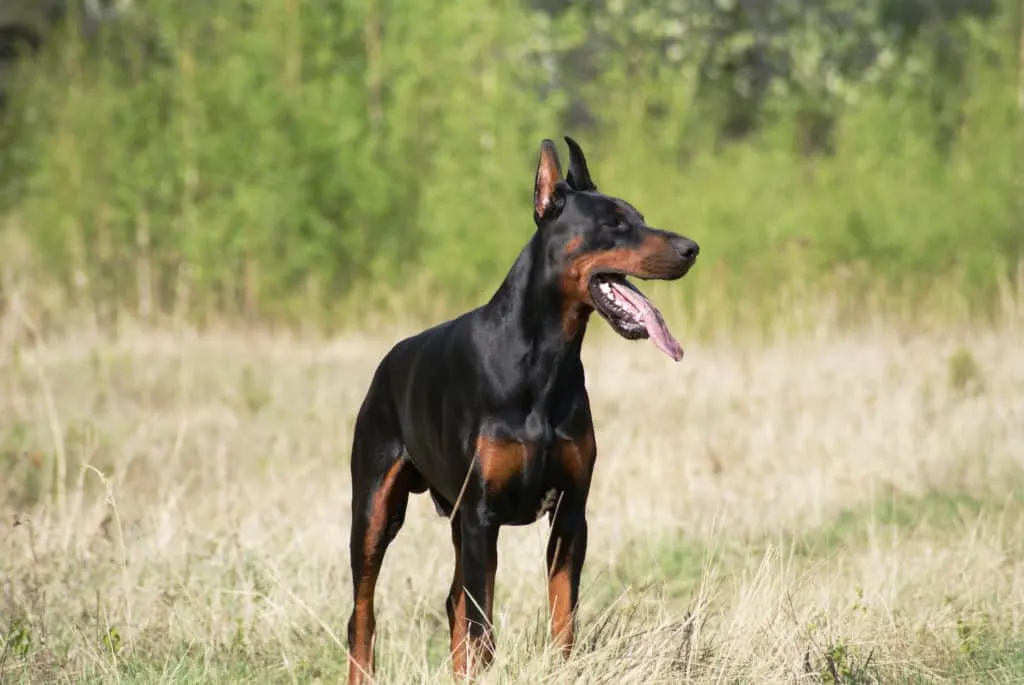
As with the German Shepherd, the Doberman has a reputation for protection, loyalty, and strength. All of this is true, but many people don’t realize the Dobie is also smart, affectionate, and sweet-natured in the right environment.
Why This Dog Is Great for Kids
These big dogs are made of rainbows and squishy hearts, believe it or not. They love deeply and they have no problem showing their humans that softer side.
Loyalty
The fierce sense of loyalty in this breed makes them great family dogs, especially with children involved. They want to be with you all the time, protect you, and keep watch. But they also want to be loved, brushed, and shown affection.
Gentleness
It may shock people to learn that these imposing, visually-stunning dogs are actually quite sensitive. While you’ll need a firm hand to train them properly, you’ll need to do so with a gentleness of your own.
Dobies are sensitive to harsh words from their humans and may become sad or upset if you yell at them. That sensitivity translates into incredible gentleness toward children, however.
Playful
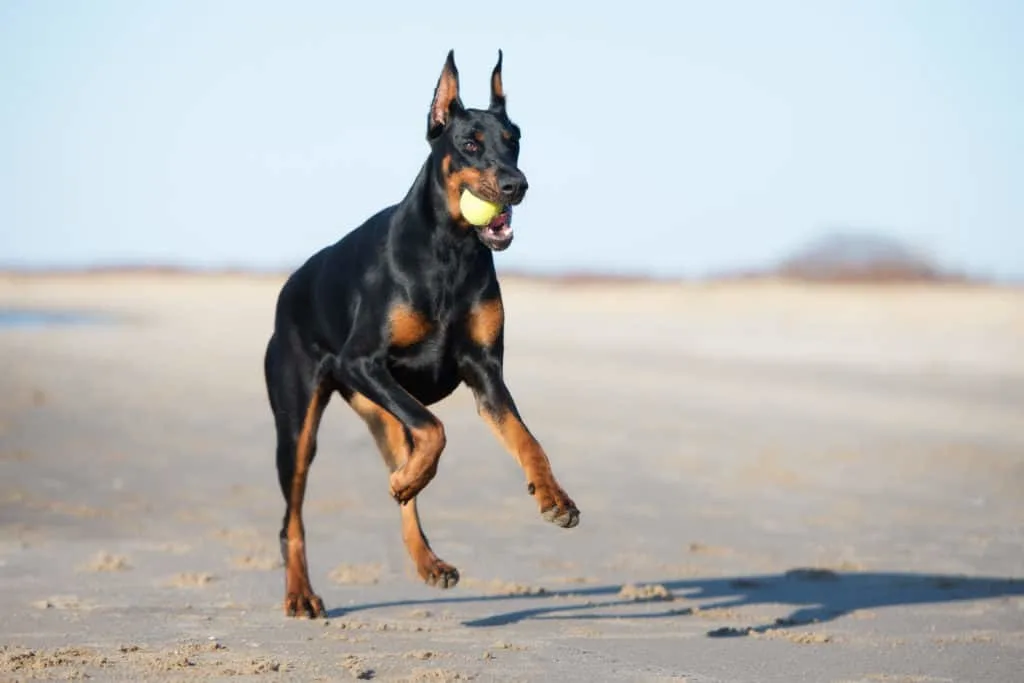
Dobermans are playful, silly dogs when they’re not at work. Children will love throwing a ball and watching this well-trained dog bring it right back, over and over.
They have a lot of energy, mixed with their large size, it means a Dobie needs a lot of playtime. Kids usually have just the right amount of energy to keep a Dobie happy.
Intelligence
These are very smart dogs. That makes training a little easier, but it also means you’ll need to provide a lot of mental stimulation for this breed.
Siberian Husky
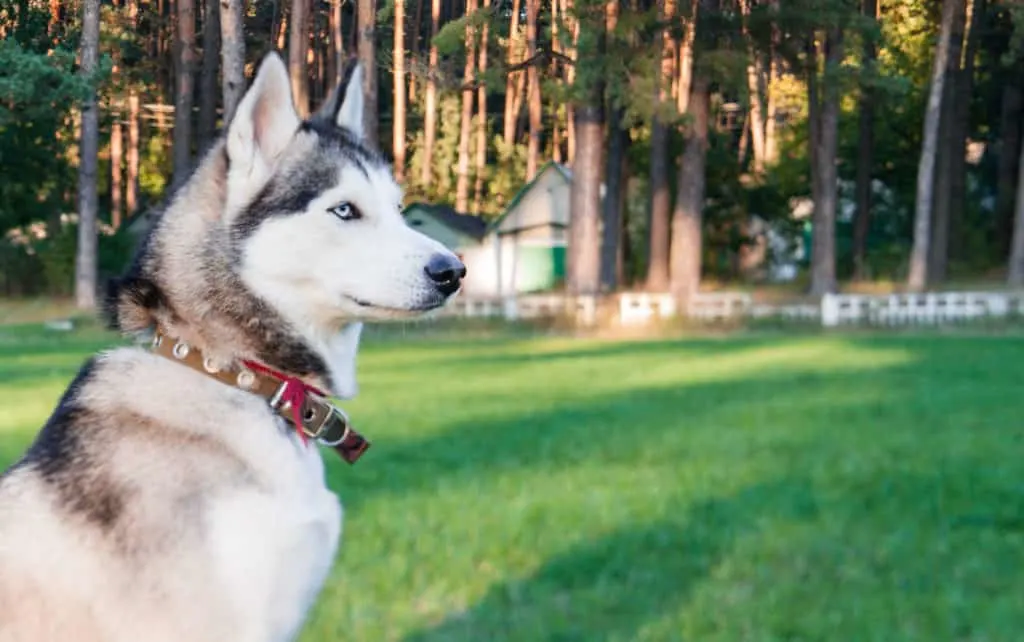
If the idea of fine, white fluff on everything doesn’t bother you, a Siberian husky is an excellent choice for a family with children. These sweet-natured, silly, vocal dogs love to cuddle, play, and stay by your side.
Because a husky can reach up to 60 pounds, it sits on the edge of the large dog breed list. However, some individual huskies can be as small as 40 pounds.
Why This Dog Is Great for Kids
The Siberian husky is a beautiful, visually-striking dog that turns heads at the dog park. Beyond their looks, they have the softest personalities with a penchant for kisses and snuggles like no other. However, they are prone to wander, so training and socialization early on are essential.
Sweetness and Affection
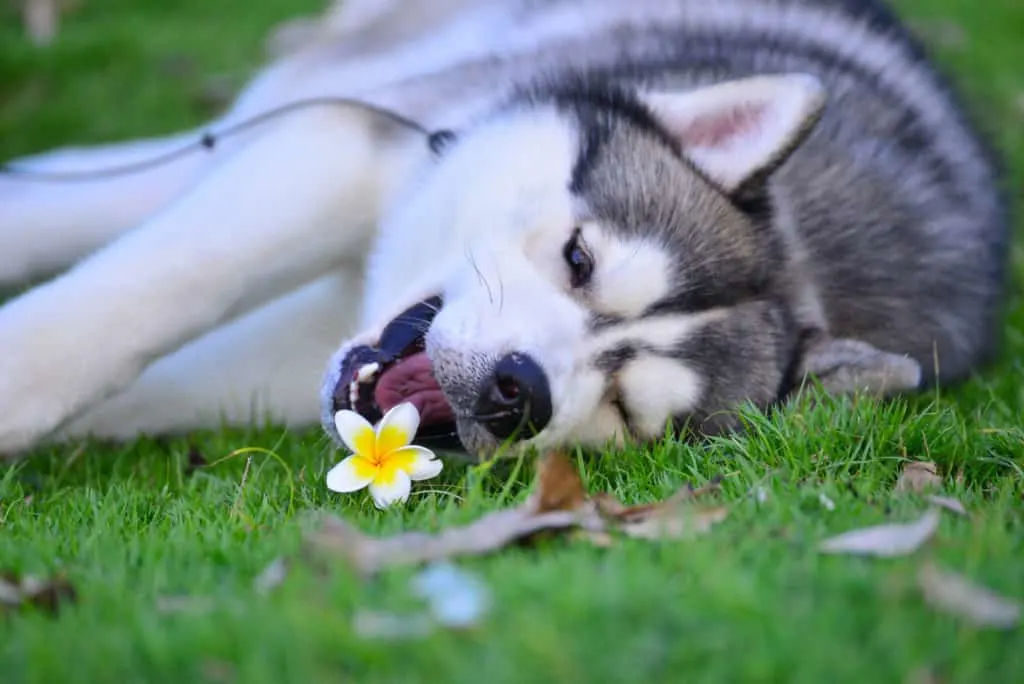
Huskies are lovers through and through. They will happily soak up all the affection you and your kids throw at them. They will return that love with exuberant kisses, snuggles, and headbutts.
Huskies are known to crawl into their humans’ laps and refuse to move until enough tummy rubs have been applied.
Playfulness
This dog breed is extremely playful and will make it a point to insist on games of fetch and tag. Huskies were bred to run, so they need a lot of exercise, and kids are usually more than happy to oblige.
Gentleness
This is another dog with a natural tendency toward gentleness. They don’t want to hurt anyone, so they often move through life with purpose and grace, making sure they don’t knock anyone over or cause harm.
This isn’t to say they’re not clumsy, but they do try to be soft and sweet toward people of all ages and sizes.
Huskies can be stubborn, so training may not be easy. You’ll likely need to enlist the help of a professional to be sure your young husky learns her commands and understands her place.
Labrador Retriever
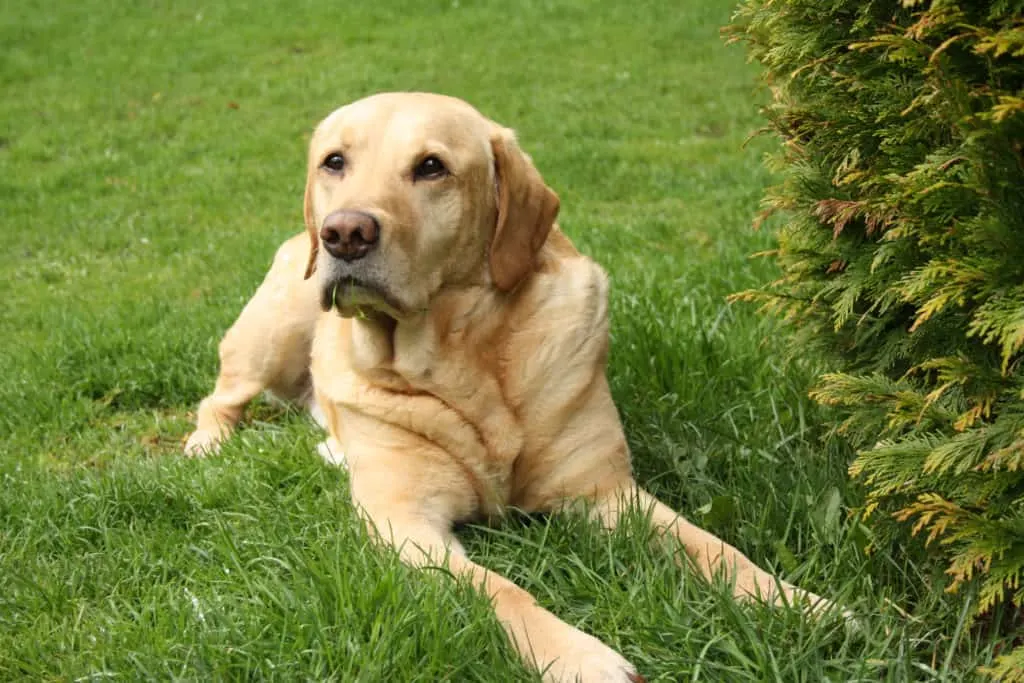
It’s no secret that the Labrador retriever is one of the most popular breeds in the United States. In fact, they’ve come in at #1 more times than we can count.
These dogs are known to be loyal, intelligent, good-natured, and patient. They have keen eyes and a sharp sense of what’s expected of them, even with very little training.
Still, as always, it’s important to provide good training to this breed to be sure all of its awesome qualities are enhanced.
Due to their innate empathy toward humans and their sweet dispositions, labs are often used as therapy dogs. They are calm, smart, and responsive to their humans’ needs, which makes them excellent family pets.
Why This Dog Is Great for Kids
Often touted as the ideal family dog, the Labrador retriever was actually bred as a hunting dog. This works in the lab’s favor though, as many of the traits that make it an excellent hunting and sporting dog also translate into being a great dog for kids.
Intelligence
A defining feature of the lab, no matter the coat color, is the large intellect they all seem to share. These smart dogs will learn fast and retain their training with relatively little work on your part.
They like to learn new things, and they enjoy pleasing their humans, so training is fun for labs.
Loyalty
The Labrador retriever is one of the most loyal large breed dogs, and they give this loyalty asking nothing in return. They bond quickly with their family, and they show no fear toward visitors or during family outings—as long as they’ve been properly socialized.
While labs may wander if allowed out of the yard, their loyalty often brings them back home. Even so, please don’t let your lab run wild! It’s not safe for any dog to be allowed to roam, no matter how loyal they are.
Gentleness
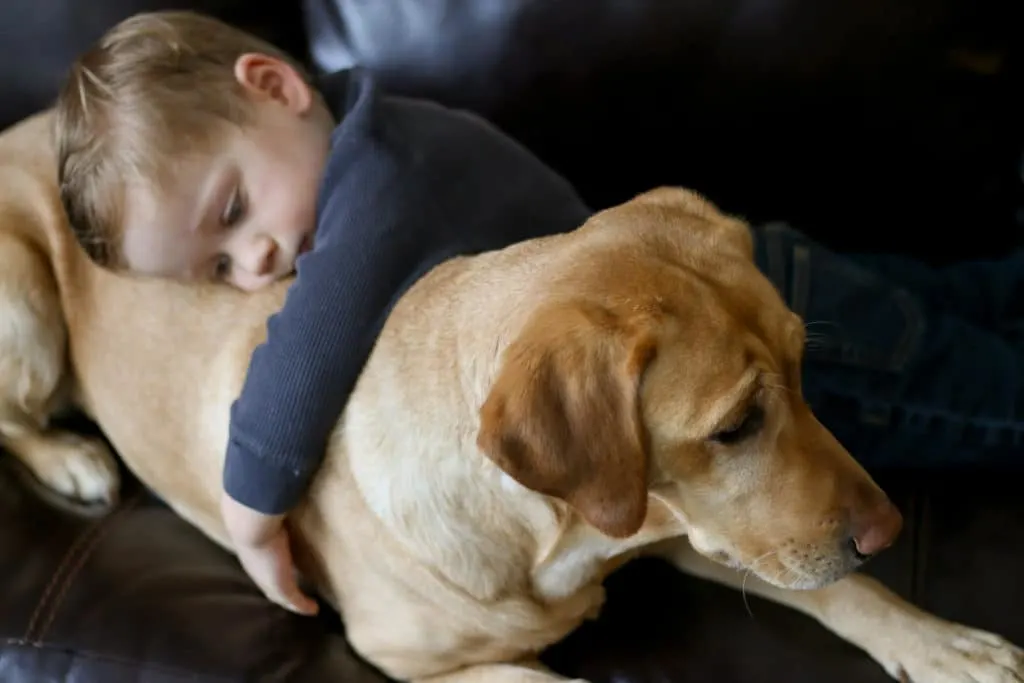
Hunting dogs need to have “soft mouth”, meaning they must be able to gently carry back prey, such as ducks or rabbits, without crushing or damaging them.
This same trait is reflected in how they will gently play with children or the adults in the family. They have no desire to hurt anyone or anything, and this is especially true if you’ve trained him properly.
This doesn’t mean they don’t like to chew; in fact, it’s best to teach your lab which things are okay to chew and which should be treated with “soft mouth”.
Patience
Labs are well-loved for their patience. This plays into their use as therapy dogs and family dogs. These gentle giants will calmly sit and be poked, rubbed, tugged, and pestered.
Though it’s best to teach children to play nicely and be gentle, labs are very patient and calm, making them unlikely to become irritated quickly or snap.
Playful
Labs are playful and affectionate dogs that will happily scamper around the yard or the house. They love to chase and play tag—this behavior taps into their hunting ability.
The soft mouth behavior makes sure they never harm a child they’re chasing or playing tug with, though.
Standard Poodle
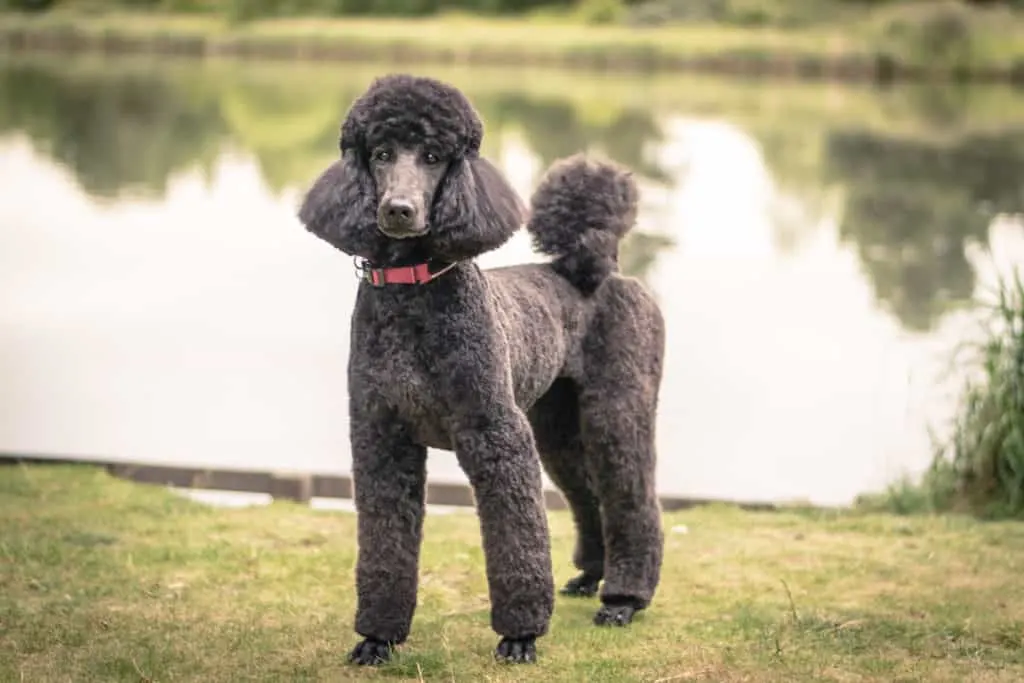
Believe it or not, the standard poodle is an excellent family dog, despite their frou-frou haircuts and prancing postures. They are smart dogs with a zest for life, love, and family. At 70 pounds, the standard poodle is not your shivering, timid lap dog.
Why This Dog Is Great for Kids
While the toy poodle is cute, the standard poodle is the one you want for kids. They are very sweet, gentle, loving, and intelligent.
They truly enjoy the company of humans, especially children. Their natural patience and curiosity help this breed stand out among the “nice to look at” family dogs.
Trainability
As an intelligent breed, the standard poodle is excessively easy to train, given the right attention. They can be stubborn if not handled well, but a trained professional can get you started.
Early training and socialization will be key to tapping into the poodle’s natural intelligence and shaping them into a great family dog.
Loyalty
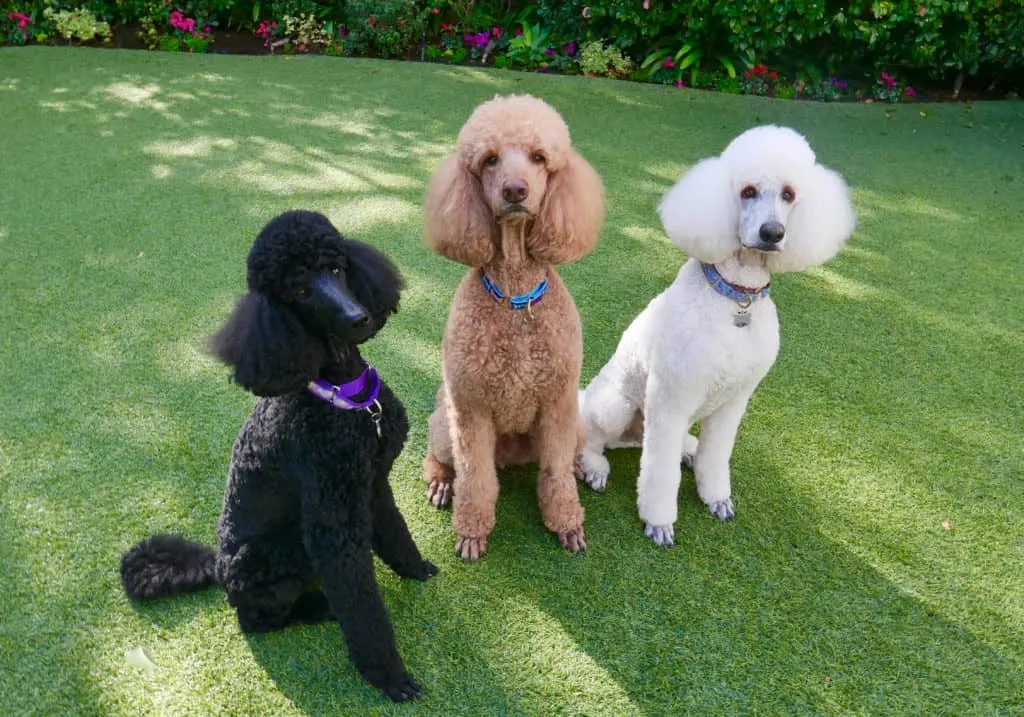
These big fluffy pups love their humans with no reservations. They bond quickly, easily, and deeply. They seem to understand family dynamics quite well, and therefore understand that children are precious and should be protected.
The drawback to this kind of loyalty is the chance for separation anxiety. Be sure to provide plenty of stimulation for your poodle if you won’t be home.
Playful
The standard poodle is energetic, playful, and silly. They love to play exciting games and will continue to play long after you’ve become tired. That boundless energy is a hit with children.
Great Dane
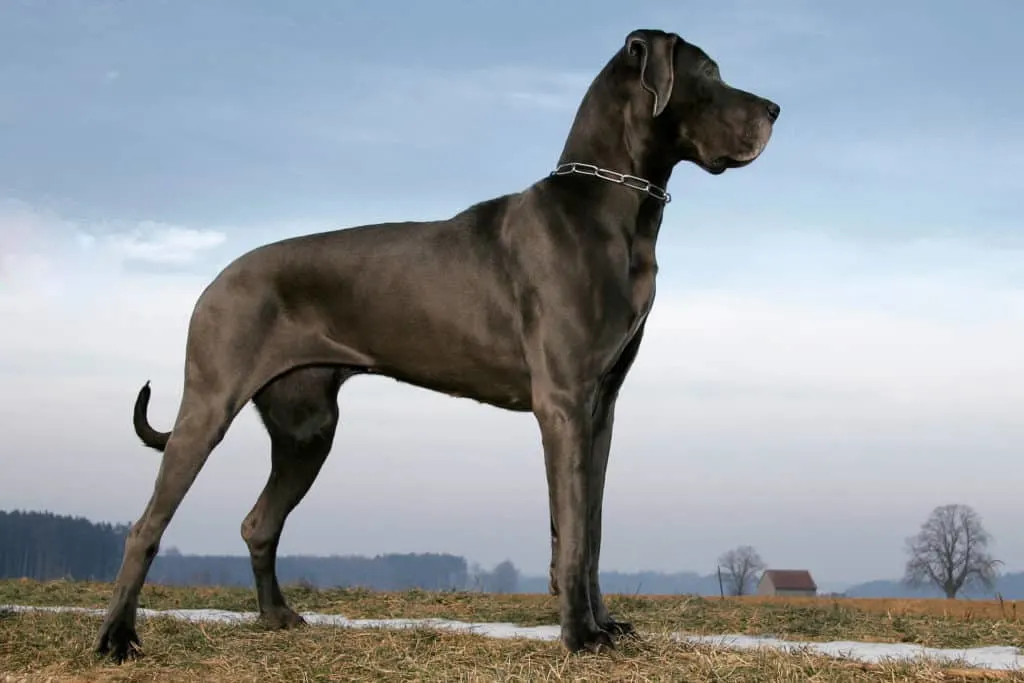
For the truly big fans of large dog breeds, feast your eyes upon the gentle giant: Great Dane. These dogs are big, lovable, lazy puppies at heart, even though they can reach a whopping 175 pounds.
If you have the space for these giant pups, you’ll be happy to know they are sweet-natured, gentle, and loyal through and through.
Kids love the Great Dane because of their size and their calm demeanor. They love the attention children often give, and they are patient, too.
Why This Dog Is Great for Kids
The Great Dane is all about affection. They are love sponges and will happily sit all day being pet and snuggled. With fairly low energy, they don’t require a lot of exercise, but they do enjoy vigorous playtime with their pack.
Gentle
The defining feature of the Great Dane is that clear and constant gentleness. They are calm, sweet, and soft toward pretty much everyone.
This doesn’t mean they don’t need training and socializing though—you’ll want to be sure you encourage this gentleness when your GD is small and easy to handle.
Sweet-natured
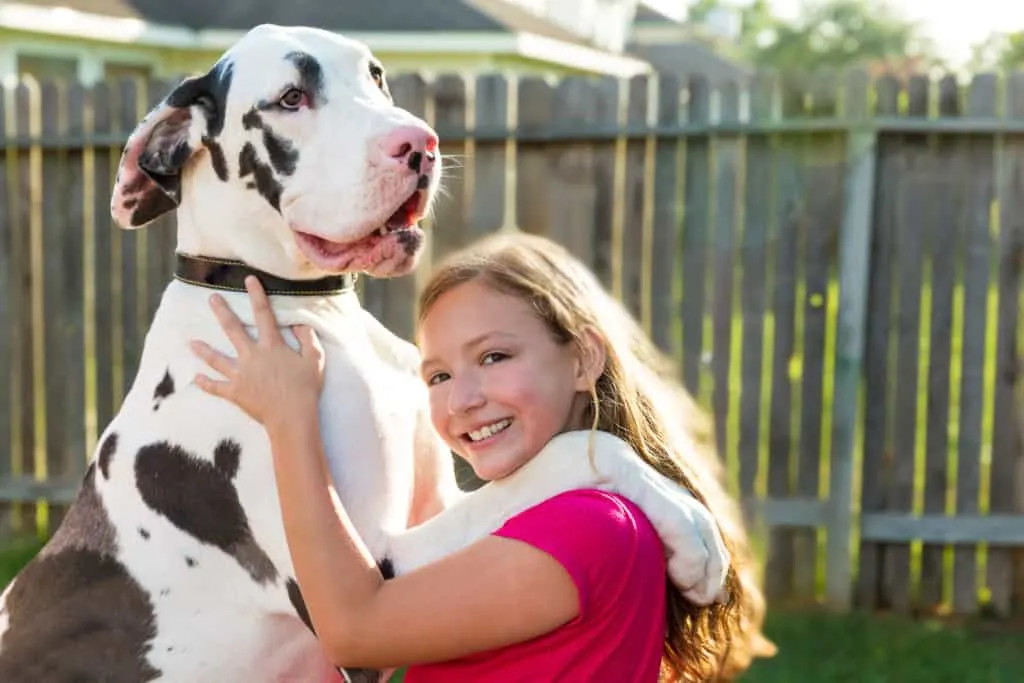
Along with the gentle touch and soft mouth, Great Danes are just sweet dogs. It would be tough to get a GD in a bad mood.
Loyal
These stalwart protectors will guard your home and family with their lives. This doesn’t mean they are aggressive, but they are cautious and aware.
They seem to know you’re entrusting the safety of your children to them, and they will take this job seriously.
Trainability
While not the easiest dog to train, they are agreeable and do wish to please you. They will respond positively to gentle but consistent commands, and they truly appreciate praise and affection as rewards.
Affectionate
These dogs love to be loved. They want to be in your lap, pressed against your body, or within arm’s reach at all times. They are appreciative of the type of affection kids often bring, and their large size means they can take it, too.
Final Thoughts
Selecting the best large breed dog for a family with kids doesn’t have to be a scary endeavor. Choosing any of the dogs showcased here is a great place to start.
Be sure to match temperament, energy level, and expectations to each individual dog you consider, not just the breed as a whole.
Above all else, be ready to invest time and money into a solid training program and socialization time to ensure your new pup is a positive addition to your home and a lifelong companion for your kids.
